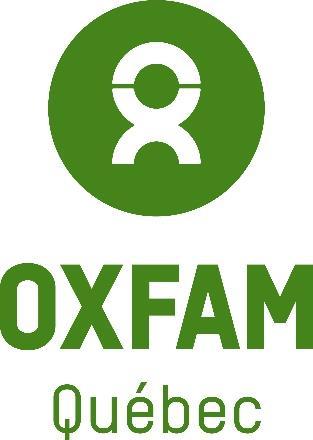Oxfam’s Recommendations for Federal Budget 2025


Submitted to the House of Commons Standing Committee on Finance August 1, 2025
Recommendations:
1. Invest a minimum of $10.6B in Official Development Assistance in 2025-26.
2. Establish a comprehensive fund dedicated to rebuilding Gaza to address humanitarian needs and long-term development.
3. Triple Canada’s 5-year international climate finance commitment to $20B and direct funds to frontline communities as grants.
4. Scale up funding for international programming in the neglected areas of Sexual and Reproductive Health and Rights.
5. Create an independent long-term Sustainability Fund for women’s and gender justice organizations in Canada, developed in consultation and collaboration with national women’s rights organizations.
6. Allocate $10B over five years to support the expansion of Canada’s early learning and child care workforce, and increase the Early Learning and Child Care Infrastructure Fund by $15B over five years to expand publicly owned spaces.
7. Increase the individual maximum amount of the Canada Disability Benefit.
8. Allocate $600M annually over four years to implement the National Action Plan to End GenderBased Violence and commit additional sustainable funding to support women’s domestic violence and emergency shelters, community-based prevention, anti-violence training and early interventions.
9. Introduce a windfall profit tax on the profits of oil and gas companies above $1B, eliminate federal support for oil and gas – including by closing subsidy loopholes, and strengthen industrial carbon pricing.
10. Implement an excess profits tax on Canadian corporations to curb profiteering.
11. Reintroduce the Climate-Aligned Finance Act to address financial institutions’ investments in emissions heavy industries and modernize Canada’s financial system to align with the principles of the Paris Agreement
12. Introduce a progressive wealth tax on the richest Canadians to redistribute wealth and power.
Canada’s Role in an Increasingly Fragile World
International cooperation is a vital investment in building a more just, peaceful and sustainable world. Canada has long positioned itself as a champion of peacebuilding, human rights, conflict resolution and development assistance. As global crises escalate and other donor governments withdraw, Canada must reaffirm its commitment to multilateralism, strengthen international partnerships and contribute to global solutions rooted in justice and solidarity.
The current geopolitical landscape is marked by profound instability. Armed conflicts, climate disasters and economic disruptions are converging, pushing millions into poverty and displacement. The UN estimates over 300 million people will require humanitarian assistance in 2025, with millions more at risk of poverty and hunger. Climate impacts are accelerating, manifesting as extreme heat, devastating floods in South and Southeast Asia and East Africa, and prolonged drought in the Sahel - undermining livelihoods, increasing food insecurity, and eroding access to clean water and essential services. Women and marginalized communities, least responsible for greenhouse gas emissions, continue to bear the greatest burden of climate impacts.
Ongoing conflicts in Sudan, Ethiopia, the Democratic Republic of the Congo, Myanmar, Yemen and Ukraine continue to force millions from their homes. Israel’s war on Gaza has taken a devastating toll on civilians and escalated violence in Lebanon and across the wider region. More than 60,000 Palestinians have died, and over a million are displaced. Israel’s genocide is causing a catastrophic humanitarian crisis and famine.
In every crisis, gender inequality deepens. Women, girls and marginalized communities face heightened risks of gender-based violence and exploitation Hard-won progress on women’s rights are being reversed, and access to essential services, including sexual and reproductive health care, are increasingly threatened. Defending human rights and advancing gender equality must remain central to Canada’s global engagement.
Canada’s global responsibility extends beyond its borders. While some G7 countries plan to reduce aid by 28 percent, Canada has yet to signal similar cuts – an important distinction that must be upheld. In 2023/24, Canada allocated $10.2 billion to official development assistance. Maintaining this commitment is essential to tackling global inequality. As military spending rises, Canada must demonstrate principled leadership by advancing human rights, meeting its international commitments and responding to humanitarian crises.
Budget 2025 should:
• Safeguard and protect Official Development Assistance (ODA) at no less than $10.6 billion for the 2025-26 fiscal year to sustain Canada’s global leadership. Any further assistance to Ukraine should be additional to the existing aid envelope and must not impede increased assistance to the rest of the world.
• Establish a comprehensive fund dedicated to rebuilding Gaza to address humanitarian needs and long-term development. Support and fund the restoration of a unified, UN-led humanitarian response to prevent further harm and uphold international legal obligations.
• Triple Canada’s international climate finance commitment to $20 billion (2026-2031) as grants, not loans, directed towards frontline communities. Allocate 40 percent of funding to climate
adaptation, 40 percent to mitigation and 20 percent to loss and damage, with gender equality and women’s rights integrated into its policy framework. This package should be distinct from the International Assistance Envelope to protect broader development priorities and reflect Canada’s fair share.
• Scale up funding for international programming in the neglected areas of Sexual Reproductive Health and Rights (access to safe abortion services, adolescent health and contraception) to meet the $700 million target outlined in Canada’s 10-year commitment to global health and rights and prioritize funding to support women’s rights and other civil society organizations.
A Fair and Sustainable Economy for All
Millions of Canadians are struggling to pay their bills, put food on the table, and afford a place to call home, with women and gender-diverse people disproportionately impacted by the affordability crisis. Canadians everywhere are feeling the pinch, especially those living in poverty. Prices of food, housing, heating and transportation have risen sharply since 2020 and are now further exacerbated by the U.S. tariffs and Canadian countermeasures Budget 2025 must restore public confidence that the federal government sees the struggles of the Canadian population and has their backs.
Tinkering at the edges of Canada’s deepening inequality crisis is no longer viable. The country needs bold, redistributive policies that dismantle current systems which entrench poverty while wealth continues to concentrate at the top. This also includes laying the groundwork for a guaranteed basic income, an essential tool to ensure economic security and dignity, particularly for those facing systemic exclusion. Economic disruptions due to trade wars and technological advances will lead to significant job losses and economic insecurity and people need to know they can rely on social protection in tough times.
As Canada’s population grows and ages, the demand for care is increasing. Since 2021, the federal government has made historic investments in building a publicly funded early learning and child care system that is crucial to the well-being of children, families, and contributes to economic security. Sustained and sufficient federal investment is needed to expand child care spaces through coordinated public planning, capping fees at no more than $10 a day, and developing strategies to recruit and retain qualified early childhood educators and staff.
ln Budget 2024, federal efforts to reduce economic hardship for people with disabilities culminated in the Canada Disability Benefit Act However, the $200 maximum monthly benefit falls far short of what disability justice advocates demand. Budget 2025 must boost funding to ensure the benefit reflects real costs of living and lifts people with disabilities out of poverty.
The growing influence of anti-gender and anti-rights movements, in Canada and globally, threatens decades of progress toward equality. Hateful rhetoric targeting marginalized groups is becoming increasingly prevalent, undermining social cohesion and human rights. Now more than ever, Canada must invest in a strong, intersectional ecosystem of equity and justice seeking organizations that can resist these forces, safeguard democratic values and address gender-based violence
Budget 2025 should:
• Create an independent long-term Sustainability Fund for women’s and gender justice organizations in Canada, developed in consultation and collaboration with national women’s rights organizations. Such a fund would provide stable, predictable core funding to women’s and gender justice organizations in their work to advance equality and achieve the realization of human rights across Canadian society.
• Allocate $10 billion over five years towards the early learning and child care workforce, in line with adequate wage grids and benefits, to enable the expansion of the $10 a Day Plan. To address rising demand and unequal access, increase the Early Learning and Child Care Infrastructure Fund by $15 billion over five years to expand publicly owned spaces, including school-age programs.
• Increase funding to raise the individual maximum amount of the Canada Disability Benefit. When combined with other federal and provincial/territorial programs, it should bring the income of all people with disabilities up to a minimum of $2,400 per month.
• Allocate at least $600 million per year over the next four years for the implementation of the National Action Plan to End Gender-Based Violence to meaningfully address accountability and monitoring at scale. Commit adequate and steady funding to sustain women’s domestic violence and emergency shelters, and increase investment in community-based prevention work, anti-violence training and early interventions.
Fair Taxation
Fair taxation is a powerful tool to tackle inequality by ensuring the richest contribute their fair share and by generating new public revenues to invest in public services. As the government moves to deliver on its commitment to “spend less and invest more,” fair taxation is key to ensuring an equitable fiscal plan that reduces poverty and prioritizes the needs of those most impacted by inequality.
Canada is facing deepening inequality. In 2024, billionaire wealth increased by $309 million a day, while millions across the country struggle with soaring food and housing costs. Nearly 1.4 million children are now living in poverty. At the same time, the total wealth of Canada’s 65 billionaires has soared to nearly $500 billion. Meanwhile, corporate profits surged to $441 billion; the skyrocket profits of fossil fuel corporations in particular, coupled with the luxury lifestyle of Canada’s ultra-rich billionaires, are driving the climate crisis. This staggering imbalance threatens democratic systems, deepens poverty and hinders climate action.
Bringing down costs for Canadians must go hand-in-hand with bold tax reforms that curb extreme wealth concentration and environmental impacts to fund public solutions and climate action. Oxfam’s recent study revealed that 75% of people in Canada support taxing oil, coal and gas companies to cover the costs of climate disaster. Last year’s capital gains taxes were a step in the right direction, and instead of back tracking on the commitment, the 2025 budget should go further. Tackling wealth inequality demands stronger measures such as an extreme wealth tax, taxation of excess corporate profits beyond the financial sector that also targets corporations in highly polluting industries, and closing loopholes that allow the ultra-rich to avoid contributions. These steps could raise over $409 billion in public revenue over the next decade, resources that could lift people out of poverty, strengthen public services and support a just energy transition.
Budget 2025 should:
• Make polluters pay by introducing a windfall profits tax on oil and gas of, at a minimum, 15% on profits above $1 billion. In addition, close all subsidy loopholes and eliminate all federal support to the fossil fuel industry, strengthen industrial carbon pricing to ensure greater levels of emissions are being covered, and invest revenues in clean energy and climate resiliency.
• Ensure Canadian corporations pay their fair share of taxes by implementing a permanent excess profits tax that can be triggered in times of crisis (US tariffs, war, pandemic etc.) to curb profiteering. This tax should apply to all companies earning outsized profits compared to their pre-crises average.
• Reintroduce the Climate-Aligned Finance Act to address financial institutions’ investments in emissions heavy industries and modernize Canada’s financial system to align with the principles of the Paris Agreement
• Introduce a progressive wealth tax on the richest Canadians immediately to redistribute wealth and power, which can raise over $32 billion in its first year. This tax should be at least 1 percent for net wealth over $10 million, 2 percent on net wealth over $50 million and 3 percent on net wealth over $100 million.
